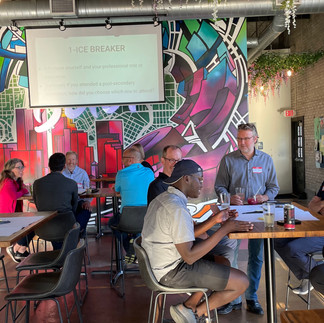Idea Jam 8 - Portara
- Matt Pacyga

- Aug 28, 2024
- 7 min read
Updated: Jun 27, 2025
Season 1 - Idea Jam 8
Spotlight Business: Portara https://theportara.com/
CLICKABLE CHAPTERS:

Event Pictures
Event Deck
Problem Statement
Portara is considering transitioning from a B2B model to a B2C approach, engaging directly with parents of high school students while exploring new business models to provide value and generate revenue.
Idea Jam Summary
The brainstorming session focused on two primary inquiries:
Exploring ways to engage with parents of high school students (including dads, moms, and caregivers)
Investigating various business models, including marketing affiliates, subscriptions, and partnerships
Participants generated many ideas, from developing personalized content delivery methods to creating innovative partnerships. Key concepts included:
Creating a multi-functional app that provides college recommendations and personalized guidance
Developing a tiered subscription model with varying levels of content and service access
Exploring strategic partnerships with educational institutions, test prep companies, and community organizations
Implementing targeted marketing strategies using social media and tailored content for different parent segments
Leveraging data analytics to provide unique insights to both parents and potential B2B clients
Building community features to allow parents to connect and share experiences
The session emphasized the importance of creating a platform that provides information and offers tools and services to support parents through the entire college preparation journey. Ideas ranged from practical solutions like essay review and interview prep to innovative concepts like AI-driven personalized guidance and virtual mentorship programs.
Participants also highlighted the need to address the diverse needs of different parent segments, recognizing that dads, moms, and caregivers may have varying concerns and preferences in how they engage with college preparation resources.
Overall, the brainstorming session aimed to position Portara as a comprehensive, trusted resource for parents navigating the complex college preparation landscape while exploring sustainable and profitable business models to support this mission.
Innovate MN - AI Analysis
TOPIC 1: Value - Engaging with Parents of High School Students
Key Ideas:
Personalized Content Delivery:
Develop multi-channel content (articles, videos, podcasts) tailored to specific parent segments
Create an AI-driven app for personalized college recommendations and guidance
Community Building:
Establish forums or virtual spaces for parents to connect and share experiences
Host in-person events and workshops for local communities
Value-Added Services:
Offer premium services like essay review, interview prep, and personalized mentorship
Provide access to data-driven insights about colleges and career paths
Targeted Outreach:
Utilize social media platforms popular with different parent demographics
Partner with community organizations, schools, and parent groups for a broader reach
TOPIC 2: Exploring Business Models
Key Areas:
Marketing Affiliate
Collaborate with test prep companies, textbook publishers, and college-related product vendors
Implement affiliate marketing strategies with carefully selected partners aligned with Portara's mission
Utilize social media influencers for content distribution and brand awareness
Create targeted ads for parents on platforms like Facebook
Partner with back-to-school retailers for co-marketing opportunities
[Your Idea Here]
Develop an AI-driven app that recommends colleges based on student profiles and preferences
Create a "college dating" platform where students can match with potential schools
Offer a service to aggregate and analyze data on college fit and scholarship opportunities
Provide a platform for virtual college tours and interactive information sessions
Develop a gamified college preparation tool that engages both parents and students
Subscription
Develop tiered subscription levels with varying access to content and services
Offer both annual and monthly payment options to cater to different preferences
Provide a freemium model with basic content free and premium features behind a paywall
Create specialized subscription packages for different parent segments (e.g., first-time college parents, parents of athletes)
Offer family plans that include access for both parents and students
Partnerships
Collaborate with ACT/SAT organizations for lead generation and content distribution
Partner with state educational bodies and non-profit organizations for broader reach and credibility
Form alliances with high schools to provide college preparation resources
Collaborate with colleges and universities for sponsored content and virtual tours
Partner with companies and professional organizations to provide industry-specific college and career guidance
Holistic Themes, Recommendations, and Roadmap
Holistic Themes:
Personalized Engagement: Tailoring content and services for different parent segments.
Multi-channel Approach: Utilizing various platforms and mediums to reach the target audience.
Value-Added Services: Offering unique insights and tools to assist in the college decision process.
Community Building: Creating spaces for parents to connect and share experiences.
Data-Driven Solutions: Leveraging data to provide personalized recommendations and insights.
What Stands Out (Patterns):
Technology Integration: Many ideas involve creating apps or using AI for personalized guidance.
Diversification: There's a strong emphasis on exploring multiple revenue streams and business models.
Partnerships: Collaboration with educational institutions, test prep companies, and non-traditional partners emerged as a recurring theme.
Content Customization: Addressing specific needs of different parent segments (dads, moms, caregivers) was highlighted.
Trust-building: Many ideas focus on establishing Portara as a trusted source of information and guidance.
Recommendations as the owners/founders of Portara:
Develop a Tiered Subscription Model: Create different levels of access to content and services, catering to various parent needs and willingness to pay.
Explore Strategic Partnerships: Pursue collaborations with ACT/SAT organizations, state educational bodies, and non-traditional partners like community organizations.
Create a Multi-functional App: Develop an application that combines college recommendations, personalized guidance, and community features.
Implement Targeted Marketing Strategies: Use social media platforms and tailored content to reach different parent segments effectively.
Expand Service Offerings: To increase the value proposition, consider adding services like essay review, interview prep, and personalized mentorship.
Leverage Data Analytics: Aggregate and analyze data to provide unique insights to parents and potential B2B clients (schools, corporations).
Build Community Features: Create forums or virtual spaces for parents to connect, share experiences, and support each other through the college preparation process.
Potential roadmap based on the idea jam session:
Phase 1: Foundation Building (3-6 months)
Conduct market research to validate the B2C model and identify specific parent/student needs
Develop a basic version of the multi-tiered subscription model
Create initial content across various formats (articles, videos, podcasts)
Build a user-friendly website with basic community features
Establish partnerships with 2-3 key educational institutions or organizations
Phase 2: Launch and Early Growth (6-12 months)
Launch the subscription service with a freemium model
Implement targeted marketing campaigns for different parent segments
Develop and launch a basic version of the personalized guidance app
Expand content library and introduce expert contributors
Start collecting and analyzing user data for insights
Phase 3: Expansion and Enhancement (12-18 months)
Enhance the app with AI-driven recommendations and additional features
Introduce more advanced community features (forums, virtual events)
Expand partnerships to include test prep companies and more educational institutions
Develop and launch specialized content for niche segments (e.g., athletes, first-generation college students)
Begin exploring data monetization opportunities
Phase 4: Diversification and Scaling (18-24 months)
Introduce new revenue streams (e.g., sponsored content, affiliate marketing)
Expand services to include one-on-one counseling or mentorship programs
Explore expansion into related markets (e.g., private high schools, trade schools)
Develop more sophisticated data analytics and reporting capabilities
Consider strategic acquisitions or partnerships to accelerate growth
Phase 5: Optimization and Innovation (24+ months)
Refine and optimize all services based on user feedback and data
Explore international expansion opportunities
Develop cutting-edge features (e.g., VR college tours, predictive analytics for career paths)
Consider developing proprietary tools or methodologies for college preparation
Evaluate the potential for going public or seeking major investment for rapid scaling
Throughout all phases:
Continuously gather and incorporate user feedback
Stay updated on trends in education, technology, and college admissions
Regularly assess and adjust the business model as needed
Maintain focus on building trust and credibility in the market
Invest in team development and organizational culture
Potential Money-Making Opportunities
Tiered Subscription Model:
Offer different levels of access to content and services
Premium tiers could include personalized guidance, exclusive resources, and expert access
Affiliate Marketing:
Partner with test prep companies, textbook publishers, and college-related product vendors
Earn commissions on referrals and sales
Sponsored Content:
Collaborate with colleges, universities, and education-related businesses for sponsored articles, videos, or webinars
Data Analytics and Reports:
Aggregate and analyze user data to create valuable insights
Sell reports to educational institutions, policymakers, or corporations
Personalized Services:
Offer premium, one-on-one college counseling sessions
Provide essay review and interview preparation services
Virtual Events and Workshops:
Host paid webinars, virtual college fairs, or expert-led workshops
White-Label Solutions:
Develop a platform that can be licensed to schools or educational organizations
Mobile App Monetization:
Create a freemium app with advanced features behind a paywall
Offer in-app purchases for additional tools or resources
Advertising:
Implement targeted, relevant ads on the free version of the platform
Create an ad network specifically for education-related businesses
Corporate Partnerships:
Develop custom college preparation programs for companies to offer as employee benefits
Merchandise:
Create and sell branded products related to college preparation and success
Lead Generation:
Provide qualified leads to colleges and universities for their recruitment efforts
Licensing Content:
License Portara's content to other educational platforms or institutions
Crowdfunding Campaigns:
Launch specific projects or scholarships funded by the Portara community
Grant Writing Services:
Offer assistance in writing scholarship and grant applications as a premium service
College Visit Planning:
Provide a paid service to plan and optimize college campus visits
Career Assessment Tools:
Develop and offer career aptitude tests and guidance as a paid feature
Parent-Student Mediation Services:
Offer conflict resolution and communication coaching for families navigating the college process
Summary of the key risks identified:
Content Quality: Content quality must be very good to maintain credibility and provide value to users.
Subscription Retention: The note "I'm not going to subscribe for more than a year" indicates a risk that users might not subscribe for more than a year.
Information Overload: Parents might feel overwhelmed by too much content or email communication.
Privacy Concerns: There were mentions of protecting parent information, suggesting privacy could be a concern for users.
Relevance and Timeliness: Keeping content up-to-date and relevant was highlighted as important, with notes about avoiding "static out-of-date info."
Trust Building: Gaining and maintaining trust with parents was identified as a crucial factor.
Differentiation: Standing out in a potentially crowded market of college preparation resources could be challenging.
Technology Integration: Risks associated with developing and maintaining effective tech solutions like apps or AI-driven tools.
Changing Market Needs: The evolving landscape of higher education and college admissions could threaten the relevance of services.
Financial Sustainability: An underlying theme was balancing providing value with generating sustainable revenue.







































Comments